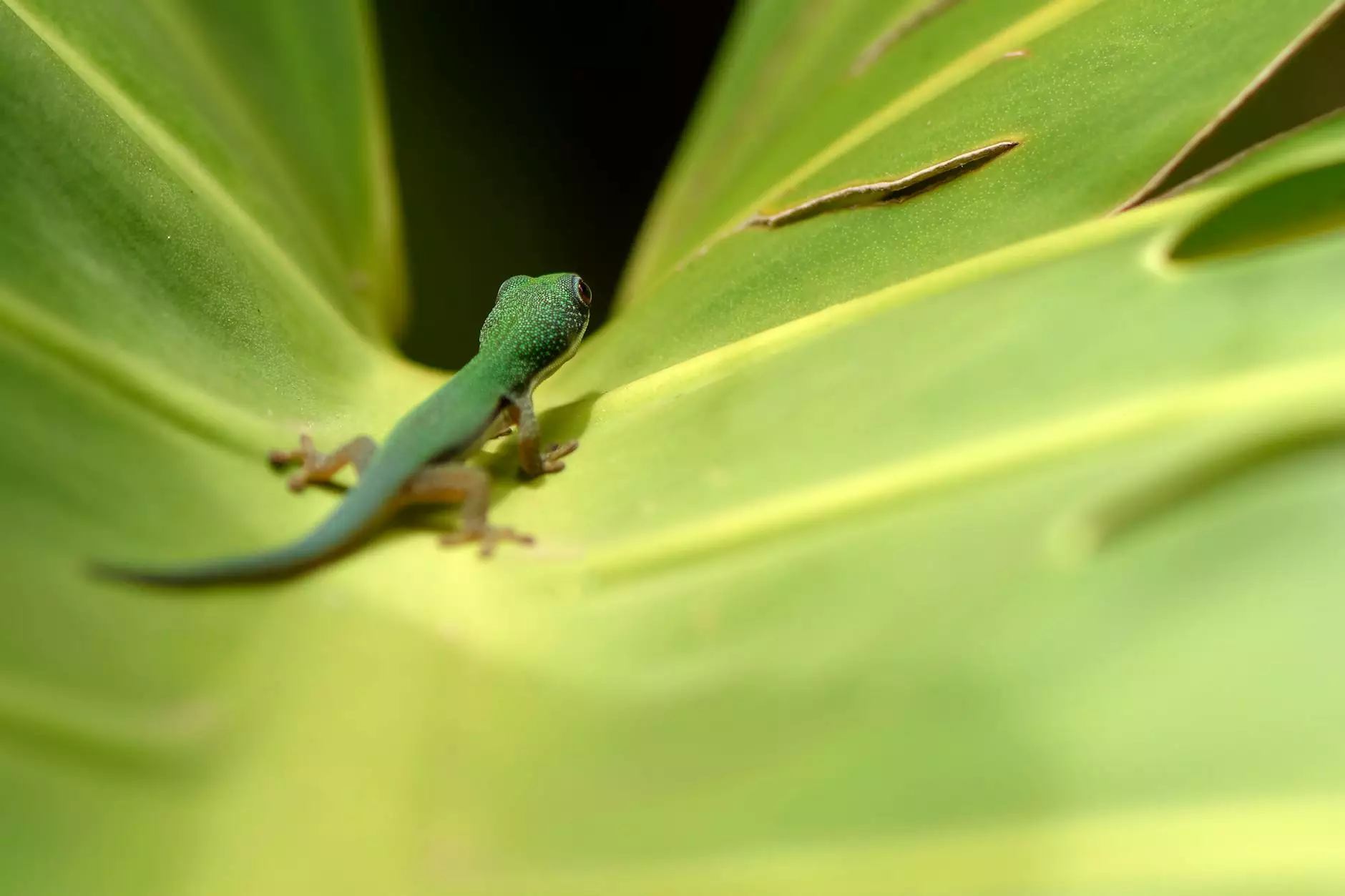Understanding Gecko Pets: The Perfect Companion for Your Home

Gecko pets have become increasingly popular among reptile enthusiasts and families alike, making them a fantastic addition to any home. With their unique characteristics and relatively low maintenance needs, geckos are not only captivating to observe but also fascinating to care for. In this article, we will delve deep into the world of gecko pets, providing you with comprehensive knowledge on how to care for them, their habitat requirements, and the best practices for ensuring they thrive.
Why Choose a Gecko Pet?
The rise in popularity of gecko pets can be attributed to several factors:
- Low Maintenance: Unlike more traditional pets, geckos require less daily upkeep, making them ideal for busy lifestyles.
- Space Efficient: They have minimal space requirements and can comfortably live in a small terrarium.
- Fascinating Behavior: Geckos exhibit interesting behaviors that are enjoyable to watch, including climbing and tail movements.
- Variety of Species: There are numerous gecko species, each with unique colors, sizes, and temperaments.
Popular Gecko Species for Pets
Several gecko species are commonly kept as pets, each offering different characteristics:
Lizards as Pets: The Crested Gecko
The Crested Gecko is perhaps the most popular in the pet trade due to its docile nature and striking appearance. They are primarily nocturnal and require a humid environment to thrive.
The Charming Leopard Gecko
Leopard Geckos are well-known for their beautiful spotted patterns and friendly demeanor. They are terrestrial and have straightforward care requirements, making them an excellent choice for beginners.
The Unique Tokay Gecko
While more challenging to care for, the Tokay Gecko stands out for its vibrant colors and loud calls. They are more aggressive than other species, making them better suited for experienced keepers.
Setting Up the Perfect Habitat for Your Gecko
Creating a suitable habitat is crucial for the health and happiness of your gecko pet. Here’s how to set it up:
Choosing the Right Enclosure
Geckos thrive in well-ventilated terrariums made of glass or plastic. For smaller species like the Crested Gecko, a 20-gallon tank is sufficient, while larger species may require more space. Make sure to include:
- Proper Size: A larger enclosure allows for more exploration and exercise.
- Secure Lid: Geckos can escape if given the chance, so ensure a secure lid on the terrarium.
- Ventilation: Proper airflow is essential to maintain humidity levels and prevent mold growth.
Maintaining Ideal Temperature and Humidity
Different gecko species have varying temperature and humidity needs, but generally, they require a warm hide and a cooler area in their habitat. Here are some tips:
- Temperature Gradient: Create a gradient between 75°F to 90°F, allowing your gecko to choose its preferred temperature.
- Humidity Levels: Most geckos thrive in humidity levels between 30%-50%, with some species like the Crested Gecko needing higher levels.
- Heating Options: Use heat mats or lamps to achieve the appropriate temperatures, but ensure they're positioned safely to avoid burns.
Substrates and Decorations
Choosing appropriate substrates and decorations is essential for your pet's safety and happiness:
- Substrates: Use non-toxic substrates like paper towels, reptile carpet, or coconut fiber. Avoid sand or loose substrates, as they can cause impaction if ingested.
- Hides and Climbing Structures: Provide plenty of hiding spots using rocks, logs, or commercially available hides. Adding branches and plants enhances their climbing opportunities.
- Water Dish: Always provide fresh water in a shallow dish, ensuring it’s easily accessible.
Feeding Your Gecko Pet
Feeding your gecko a well-balanced diet is crucial for its health. Here are some dietary guidelines:
Understanding Dietary Needs
Different gecko species have different dietary requirements:
- Crested and Leppard Geckos: Primarily eat insects like crickets, mealworms, and specially prepared gecko diets.
- Tokay Geckos: Require a diet primarily of insects but may also enjoy fruit occasionally.
Feeding Schedule
Young geckos may need to be fed daily, while adults can be fed every 2-3 days. Ensure the insects are no larger than the width of the gecko’s head and dust the food with calcium and vitamin supplements regularly to promote health.
Health Care for Your Gecko
Regular health checks and proper care practices can help prevent health issues:
Common Health Issues
Geckos can experience a variety of health problems, including:
- Metabolic Bone Disease: Often caused by a calcium deficiency, leading to weak bones.
- Skin Issues: From shedding problems to infections, keep an eye on their skin health.
- Respiratory Infections: Caused by improper humidity levels or poor ventilation.
Regular Veterinary Care
Schedule regular check-ups with a vet knowledgeable about reptiles. Vaccination is not typically required, but preventative care is essential for maintaining your gecko's health.
Behavior and Handling of Gecko Pets
Understanding your gecko’s behavior can facilitate a positive human-animal bond:
Handling Your Gecko
While geckos can be calm and handleable, it’s important to introduce them to handling gradually:
- Start Slowly: Let your gecko acclimate to your presence before attempting to handle it.
- Support Their Body: When holding your gecko, support its entire body to prevent accidents and stress.
- Limit Stressful Interactions: Avoid loud noises and sudden movements around your gecko.
Recognizing Stress and Signs of Discomfort
Watch for signs of stress such as hiding, lethargy, or changes in appetite. If your pet displays discomfort, consider reducing handling time and enhancing the habitat's comfort levels.
Adopting a Gecko: Your Guide to Pet Adoption
When considering a gecko pet adoption, it’s vital to research thoroughly and ensure you choose a healthy and suitable gecko:
Choosing the Right Source
Look for reputable sources such as local pet stores, breeders, and adoption shelters. Always ask about the pet's history, health, and care requirements. Consider adopting through reputable organizations like buyreptiles.com.au, where you can find a variety of geckos waiting for a loving home.
Preparation Before Adoption
Prior to bringing a gecko home, ensure that you have prepared its habitat, food supply, and all necessary equipment. Familiarize yourself with their care requirements to minimize the transition stress for your new pet.
Conclusion: Making the Most of Having a Gecko Pet
Gecko pets can add a delightful dimension to your life with their unique beauty and behaviors. By understanding their care needs and creating a suitable environment, you can forge a rewarding and enriching relationship with your pet gecko. Remember, responsible ownership involves continuous learning about your pet's specific needs, so always seek out various resources, including communities and online forums, for additional support. Whether you are a seasoned reptile keeper or a newcomer eager to explore the world of geckos, embracing the journey of pet ownership will surely be a fulfilling experience.
For more information and resources on reptile care, visit buyreptiles.com.au.









